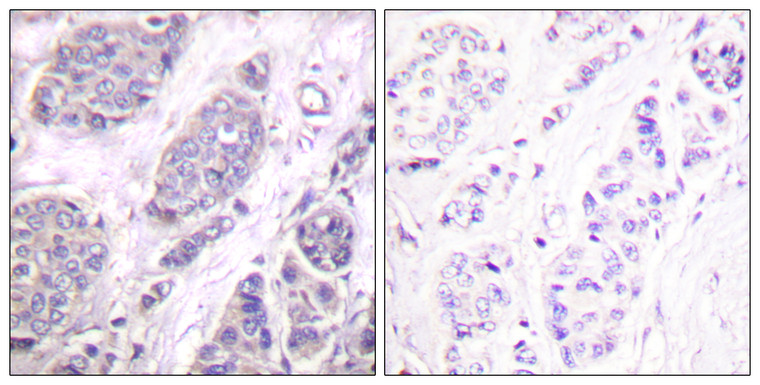| Host: |
Rabbit |
| Applications: |
WB/IHC/IF/ELISA |
| Reactivity: |
Human/Mouse/Rat/Monkey |
| Note: |
STRICTLY FOR FURTHER SCIENTIFIC RESEARCH USE ONLY (RUO). MUST NOT TO BE USED IN DIAGNOSTIC OR THERAPEUTIC APPLICATIONS. |
| Short Description: |
Rabbit polyclonal antibody anti-Transforming growth factor beta-3 proprotein (261-310 aa) is suitable for use in Western Blot, Immunohistochemistry, Immunofluorescence and ELISA research applications. |
| Clonality: |
Polyclonal |
| Conjugation: |
Unconjugated |
| Isotype: |
IgG |
| Formulation: |
Liquid in PBS containing 50% Glycerol, 0.5% BSA and 0.02% Sodium Azide. |
| Purification: |
The antibody was affinity-purified from rabbit antiserum by affinity-chromatography using epitope-specific immunogen. |
| Concentration: |
1 mg/mL |
| Dilution Range: |
WB 1:500-1:2000IHC 1:100-1:300ELISA 1:10000IF 1:50-200 |
| Storage Instruction: |
Store at-20°C for up to 1 year from the date of receipt, and avoid repeat freeze-thaw cycles. |
| Gene Symbol: |
TGFB3 |
| Gene ID: |
7043 |
| Uniprot ID: |
TGFB3_HUMAN |
| Immunogen Region: |
261-310 aa |
| Specificity: |
TGF Beta 3 Polyclonal Antibody detects endogenous levels of TGF Beta 3 protein. |
| Immunogen: |
The antiserum was produced against synthesized peptide derived from the human TGF beta3 at the amino acid range 261-310 |
| Function | Transforming growth factor beta-3 proprotein: Precursor of the Latency-associated peptide (LAP) and Transforming growth factor beta-3 (TGF-beta-3) chains, which constitute the regulatory and active subunit of TGF-beta-3, respectively. Latency-associated peptide: Required to maintain the Transforming growth factor beta-3 (TGF-beta-3) chain in a latent state during storage in extracellular matrix. Associates non-covalently with TGF-beta-3 and regulates its activation via interaction with 'milieu molecules', such as LTBP1 and LRRC32/GARP, that control activation of TGF-beta-3. Interaction with integrins results in distortion of the Latency-associated peptide chain and subsequent release of the active TGF-beta-3. Transforming growth factor beta-3: Multifunctional protein that regulates embryogenesis and cell differentiation and is required in various processes such as secondary palate development. Activation into mature form follows different steps: following cleavage of the proprotein in the Golgi apparatus, Latency-associated peptide (LAP) and Transforming growth factor beta-3 (TGF-beta-3) chains remain non-covalently linked rendering TGF-beta-3 inactive during storage in extracellular matrix. At the same time, LAP chain interacts with 'milieu molecules', such as LTBP1 and LRRC32/GARP that control activation of TGF-beta-3 and maintain it in a latent state during storage in extracellular milieus. TGF-beta-3 is released from LAP by integrins: integrin-binding results in distortion of the LAP chain and subsequent release of the active TGF-beta-3. Once activated following release of LAP, TGF-beta-3 acts by binding to TGF-beta receptors (TGFBR1 and TGFBR2), which transduce signal. |
| Protein Name | Transforming Growth Factor Beta-3 Proprotein Cleaved Into - Latency-Associated PeptideLap - Transforming Growth Factor Beta-3Tgf-Beta-3 |
| Database Links | Reactome: R-HSA-114608Reactome: R-HSA-2129379Reactome: R-HSA-2173789Reactome: R-HSA-3000178 |
| Cellular Localisation | Latency-Associated Peptide: SecretedExtracellular SpaceExtracellular MatrixTransforming Growth Factor Beta-3: Secreted |
| Alternative Antibody Names | Anti-Transforming Growth Factor Beta-3 Proprotein Cleaved Into - Latency-Associated Peptide antibodyAnti-Lap - Transforming Growth Factor Beta-3 antibodyAnti-Tgf-Beta-3 antibodyAnti-TGFB3 antibody |
Information sourced from Uniprot.org
12 months for antibodies. 6 months for ELISA Kits. Please see website T&Cs for further guidance









